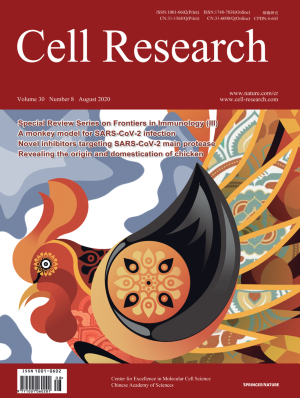
Advanced Search
Submit Manuscript
Advanced Search
Submit Manuscript
Volume 30, No 8, Aug 2020
ISSN: 1001-0602
EISSN: 1748-7838 2018
impact factor 17.848*
(Clarivate Analytics, 2019)
Volume 30 Issue 8, August 2020: 660-669 |
Immune checkpoint signaling and cancer immunotherapy
Xing He1 , Chenqi Xu1,2,*
1State Key Laboratory of Molecular Biology, Shanghai Science Research Center, CAS Center for Excellence in Molecular Cell Science, Shanghai Institute of Biochemistry and Cell Biology, Chinese Academy of Sciences, University of Chinese Academy of Sciences, Shanghai 200031, ChinaImmune checkpoint blockade therapy has become a major weapon in fighting cancer. Antibody drugs, such as anti-PD-1 and anti-PD-L1, demonstrate obvious advantages such as broad applicability across cancer types and durable clinical response when treatment is effective. However, the overall response rates are still unsatisfying, especially for cancers with low mutational burden. Moreover, adverse effects, such as autoimmune symptoms and tumor hyperprogression, present a significant downside in some clinical applications. These challenges reflect the urgent need to fully understand the basic biology of immune checkpoints. In this review, we discuss regulation of immune checkpoint signaling at multiple levels to provide an overview of our current understanding of checkpoint biology. Topics include the regulation of surface expression levels for known immune checkpoint proteins via surface delivery, internalization, recycling, and degradation. Upon reaching the surface, checkpoints engage in both conventional trans and also cis interactions with ligands to induce signaling and regulate immune responses. Novel therapeutic strategies targeting these pathways in addition to classical checkpoint blockade have recently emerged and been tested in preclinical models, providing new avenues for developing next-generation immunotherapies.
https://doi.org/10.1038/s41422-020-0343-4